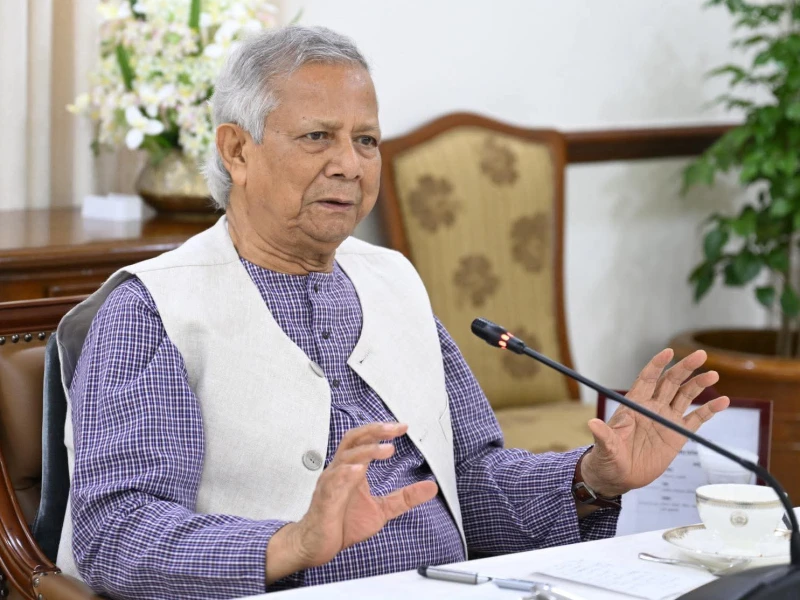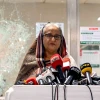As political temperatures continue to rise in Bangladesh over the much-hyped July Charter and the planned referendum on its implementation, the interim government has called for completing election preparations by 15 November, reaffirming that the 13th parliamentary election is approaching amid intensifying uncertainty.
At a high-level meeting on Wednesday, Chief Adviser Prof Muhammad Yunus cautioned that the forthcoming polls could face significant challenges from both domestic and foreign quarters attempting to derail the democratic process.
Many forces from inside and outside the country will work to spoil the election. Many powerful forces, not minor ones, will attempt to thwart the election. Sudden attacks may come. This election will be challenging. No matter how many obstacles come our way, we must overcome them,” said Press Secretary Shafiqul Alam, quoting Prof Yunus after the meeting held at the State Guest House Jamuna in Dhaka.
Later, briefing reporters at the Foreign Service Academy, Shafiqul Alam said the meeting primarily discussed four issues: posting of field-level officials during the election period, combating misinformation and disinformation on social media, training of election officials, and security measures.
Prof Yunus expressed particular concern about planned propaganda campaigns aimed at discrediting the election process.
Various types of propaganda will be carried out in a planned manner from inside and outside the country to spoil the election,” he was quoted as saying, warning that AI-generated images and videos might be used to spread confusion.
He instructed relevant authorities to act swiftly to counter such digital threats and stressed the importance of public awareness. According to him, a fair and festive election depends on whether voters understand the procedures — from identifying polling stations to casting ballots and responding to any disruptions.
To that end, the Chief Adviser urged the Election Commission and the Cultural Affairs Ministry to produce more television commercials, documentaries, and short videos explaining the process in simple language and disseminating them widely on YouTube and social media.
People need to understand electoral guidelines, polling station procedures, how to cast their votes and what to do in case of any disturbances,” Prof Yunus said, calling for active civic participation.
BNP questions ‘mismatch’ between July Charter and Commission report
While the interim administration focuses on election preparations, opposition parties have voiced growing dissatisfaction with the National Consensus Commission and its recommendations.
BNP Standing Committee Member Salahuddin Ahmed on Wednesday alleged that the Commission’s report does not reflect the discussions held with political parties, nor does it align with the provisions of the July Charter, which was formally signed on 17 October.
The charter includes only the Commission’s proposals. It does not mention what the political parties recommended, where consensus was reached, or where notes of dissent were recorded,” Salahuddin said at a seminar in Dhaka.
He argued that the document presented at the South Plaza of the National Parliament was supposed to embody the collective decisions reached through months of deliberation, but the final version lacks consistency.
The BNP leader also questioned the rationale behind including proposals to amend 48 articles of the Constitution, subjecting them to a national referendum.
If this was their plan all along, then what was the point of holding 11 months of discussions under the Commission?” he asked.
Salahuddin further alleged that when parties sought assurances regarding the charter’s implementation, the BNP had proposed a gazette notification to make it binding — an idea most parties initially supported but the Commission later dropped.
I often felt isolated, as if I alone was on the opposing side. It seemed the Commission and several parties tried to impose their decisions,” he said.
He added that some issues now slated for referendum were never even discussed during the Commission’s sessions.
Salahuddin expressed concern that the current approach would widen political divides rather than build national unity, calling the Election Commission’s directive forcing alliance members to contest under their own symbols “undemocratic”.
“We still hope the interim government will act as a true caretaker administration, maintaining neutrality in all its functions,” he concluded.
Seeking Referendum
Meanwhile, the political impasse deepened as eight parties on Wednesday demanded that the government immediately announce the referendum date, warning that any delay could push back the national polls.
Addressing a joint press conference at the National Press Club, Bangladesh Jamaat-e-Islami Secretary General Mia Golam Porwar said, “The longer the government delays announcing the referendum date, the greater the risk that the national election will be postponed.”
Porwar said the Consensus Commission’s recommendations had created a “critical situation”, and it was now up to the government to take decisive action. “We clearly state that it is the government’s responsibility to declare the referendum date without delay. The longer the delay, the greater the uncertainty surrounding the national election,” he emphasised.
Islami Andolon Bangladesh Secretary General Yunus Ahmad, reading out the written statement on behalf of the coalition, accused a particular party of trying to amend parts of the Representation of the People Order (RPO) to serve its own interests.
“This attempt will be resisted,” he warned.
Ahmad announced that the coalition would submit a memorandum to the Election Commission on Thursday (30 October), demanding that both the referendum and national polls be conducted in November based on the July Charter.
He added that a major political programme would be declared on 3 November to intensify their movement.
The press conference was attended by top leaders of Jamaat-e-Islami, Islami Andolon, and six other political parties — all urging the Chief Adviser to take immediate steps to “clear the political clouds” hanging over the election process.


 Prev Post :
Prev Post :
-1761804140.webp)